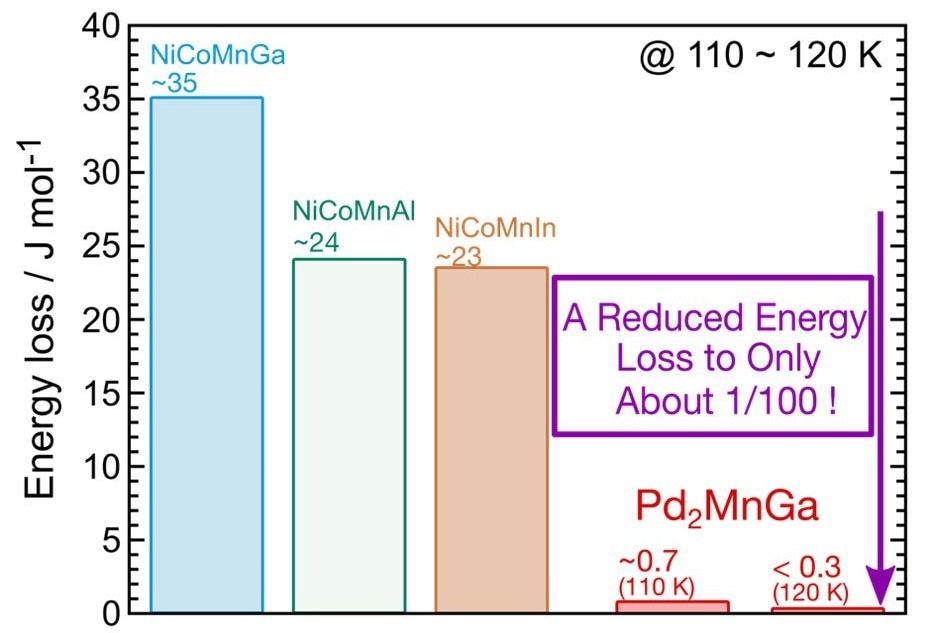Shape memory alloys (SMA) reminisce their original shape and get back to it after heating. Like how a liquid converts into gas upon heating, SMAs undergo a phase transformation when cooled or boiled. The transformation of the phase happens with the atomic movement, which is not visible to the naked eye.
 Comparison of the energy loss of the current Pd-based alloy against previous alloys. Image Credit: Xiao Xu et al.
Comparison of the energy loss of the current Pd-based alloy against previous alloys. Image Credit: Xiao Xu et al.
SMAs are used in a wide range of applications, which include sensors and actuators. Nevertheless, the requirement to heat or cool SMAs implies a delay in their phase transformation.
As a newly developed SMA type, metamagnetic shape memory alloys (MMSMA) contradict this inadequate response rate due to their capacity to go through phase transformation when subjected to an external magnetic field. Until now, MMSMAs have been unsuccessful in solving another typical problem with most SMAs: they miss a large quantity of energy at the time of phase transformation—something that deteriorates considerably in low temperatures.
Currently, a study team from Tohoku University has made a noteworthy advance, by building a palladium-based (Pd) MMSMA that comes with low energy loss. Even at low temperatures of approximately 100 K, this energy loss was minimized to just around 1/100 when compared to the present MMSMAs.
We were astonished at the small energy loss in our new Pd-based alloy. Thus, our study also sought to answer two questions. How does the energy loss behave when the temperature lowers even further, such as at the liquid-helium temperature (4.2 K), and why did our material exhibit such a small energy loss?
Xiao Xu, Study Corresponding Author and Assistant Professor, Graduate School of Engineering, Tohoku University
To perform this, Xu and his coworker at Tohoku University’s Institute for Materials Research (IMR) teamed up with the University of Tokyo’s Institute for Solid State Physics (ISSP). First, they performed magnetization measurements with the use of pulsed high magnetic fields at liquid-helium temperature. Similar to earlier SMAs, the recently built Pd-based SMA also showed an increase in energy loss as the temperature dropped. However, even now, the energy loss is considerably less than current SMAs.
The team then conducted X-Ray diffraction measurements, at low temperatures as well as under strong magnetic fields, showing that the new Pd-base alloy had improved lattice compatibility for phase transformation. The crystals inside the structures have the potential to change more easily and this described why it showed a smaller energy loss in comparison to the current SMAs.
We are also surprised to see that our Pd-based alloy can show a large magnetostriction (the ability to change the dimension when an external magnetic field is present) comparable to rare-earth materials at low temperatures. This breakthrough has wider benefits for creating a sustainable future. Hydrogen energy is becoming increasingly prominent as a clean energy source. Since transporting hydrogen often involves converting it to liquified helium, the need for technology that can operate at low temperature is growing. Our Pd-based alloy functions with limited energy loss even at low-temperatures and could be employed as magnetic sensors and actuators.
Xiao Xu, Study Corresponding Author and Assistant Professor, Graduate School of Engineering, Tohoku University
Journal Reference:
Ito, T., et al. (2023). Pd2 MnGa Metamagnetic Shape Memory Alloy with Small Energy Loss. Advanced Science. https://doi.org/10.1002/advs.202207779.